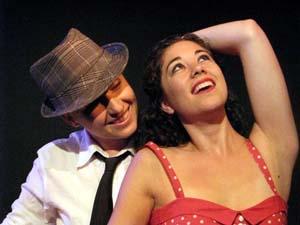A Night of Shorts (06/05/2009)

The Wellesley Project’s inaugural show, A Night of Shorts, brought six single-scene dramatic performances and two choreographed pieces to the WorkShop Theatre for a short-run at the beginning of June. While home for the Project is New York City, its namesake—Wellesley College—figures as the catalyzing spirit behind the Project’s conception. Its founders, Caitlin Graham and Janice Yang, envisioned the Project as an artistic medium for women to pursue opportunities in both theater and production. In addition to a handful of other women writers, the two composed two individual pieces for the show. While topically disparate in scope, the show consisted of a medley of performances that all focused thematically on the issue of relationships, which explored both the sexual and the platonic.
Both in spirit and in conceptualization, A Night of Shorts is bold and eclectic. The second performance, “The Tracks are Electrified,” by Jane Miller, is undeniably the most captivating short of shorts. In this piece, Miller contemplates how the concepts of trust and love function in a relationship. A young couple—Rosy (Allison Whittinghill) and Max (Rocio Mendez)—find themselves debating the relationality of the two concepts: are trust and love mutually exclusive, or inextricably connected? Can you claim to love someone fully, entirely, while simultaneously maintaining that you can never trust that person entirely? This is Max’s position, whereas Rosy advocates that one cannot exist without the other. And, can a relationship survive between two people who abide such contrasting ethics? The two actors create a superb dynamic of play and intellectual tension that renders every moment of dialogue overfull of emotional intensity.
The other standout performances included the two choreographed numbers, both of which were directed by Erin Porvaznika, who also directed “The Tracks.” Set to Nina Simone’s “I Want a Little Sugar in My Bowl” and Frank Sinatra’s “How About You?,” respectively, both pieces evoked the utopian feel of the mid-twentieth century. The routines were lighthearted and fun, and, frankly, sexy—that is, if one finds a handful of women dancing together sexy.
Beyond these three performances, however, the show exhibited moments of unevenness and inconsistency, particularly in execution. Some technical devices, such as having a character share a dialogue with another character seated in the audience, seem devoid of formal or thematic significance to the development of the plot. Other pieces at times tended towards a type of gratuitousness that came across as sophomoric; for instance, the protagonist of “Wine Diatribe” takes off her clothes while flirting with someone—perhaps the audience? or, an imaginary character in the audience?—offstage. She seems to get herself off more than anything else (particularly when she crudely wonders if all lesbians imagine licking their mothers’ pussies). The performance is poorly acted and executed, and, as a result, it just does not come together cogently in the end.
That being said, A Night of Shorts was, in short, quite entertaining and quite a laudable feat for an inaugural show. Perhaps it was just feeling the magical potential of being in a theatre, perhaps it was the feeling of anticipation that precipitates the unknowability of the series of performances that awaits the audience, but there was some thing, some quality, that was simply wonderful to witness unfold as the audience member is beckoned into an idyllic Wellesleyian world.